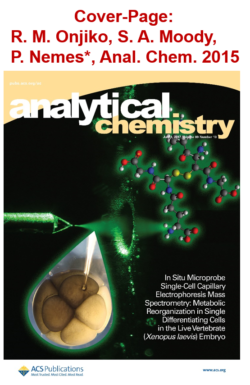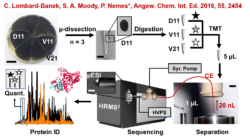
Education
- M.S. Chemistry (Analytical) (summa cum laude), 1999–2004, Eotvos Lorand University, Budapest, Hungary (with Prof. Karoly Vekey, Chemical Research Center, Hungarian Academy of Sciences, Budapest, Hungary)
- Ph.D. Chemistry (Analytical), 2005–2009, The George Washington University, Washington, DC (with Prof. Akos Vertes)
- Postdoctoral Fellow (Bioanalytical Neuroscience), 2009–2011, University of Illinois at Urbana-Champaign, Champaign, IL (with Prof. Jonathan V. Sweedler)
Professional Experience
- Professor, Department of Chemistry & Biochemistry, University of Maryland at College Park, 2023–
- Executive Board Member, Arnold and Mabel Beckman Foundation, Irvine, CA, 2019–Present
- Associate Professor, Department of Chemistry & Biochemistry, University of Maryland at College Park, 2018–2023
- Adjunct Associate Professor, Department of Anatomy and Cell Biology, School of Medicine and Health Sciences, The George Washington University, Washington, DC, 2017–Present
- Assistant Professor, Department of Chemistry, The George Washington University, 2013–2017
- Co-Chair, Washington-Baltimore Mass Spectrometry Discussion Group, 2011–2013
- Staff Fellow and Laboratory Leader, US Food and Drug Administration, Silver Spring, MD (FDA), 2011–2013
- Science Advisory Board Member, Protea Biosciences, Morgantown, WV, 2009–2019
Research Interests
Next-generation technologies for mass spectrometry; metabolomics; proteomics; mechanisms of cell and neurodevelopmental biology; cell fate specification; neurodegenerative diseases
Major Recognitions and Honors
- Presenter of the Tutorial Lecture on Single-cell Mass Spectrometry, The American Society for Mass Spectrometry (ASMS), 2020
- Georges Guiochon Faculty Fellowship Award, HPLC Inct., 2018
- Research Award, American Society for Mass Spectrometry (ASMS), 2017
- Scientific Achievement Award, US Food and Drug Administration (FDA), 2017 (FDA co-recipients: Samanthi Wickramasekara, Hongli Li, and David Keire)
- Robert J. Cotter New Investigator Award, US Human Proteome Organization (HUPO), 2017
- DuPont Young Professor Award, DuPont company (Wilmington, DE), 2017
- Arthur F. Findeis Award for Achievements by a Young Analytical Chemist, American Chemical Society (ACS) Division of Analytical Chemistry, 2016
- Helmsley Fellowship for cross-disciplinary academic and scientific career, Cold Spring Harbor Laboratory (Cold Spring Harbor, NY), 2016
- Emerging Investigator, Journal of American Society for Mass Spectrometry (JASMS), 2016
- Emerging Investigator, Analyst, 2016
- Beckman Young Investigator, Arnold and Mabel Beckman Foundation (Irvine, CA), 2015
- FDA Special Recognition Award, US Food and Drug Administration (Silver Spring, MD), 2011
- Science and Technology Innovation Award, Baxter Healthcare Corporation (Chicago, IL), 2010
- American Institute of Chemists prize in Chemistry, The American Institute of Chemists (Washington, DC), 2009
- Young Investigator Travel Award, Washington-Baltimore Mass Spectrometry Discussion Group, 2009
- International Research Fellowship Award, Dimitris N. Chorafas Foundation (Luzern, Switzerland), 2008
- Young Investigator Travel Award, Washington-Baltimore Mass Spectrometry Discussion Group, 2007
Significant Professional Service and Activities
Ad hoc reviewer for the National Science Foundation (NSF), National Institutes of Health (NIH), ACS Petroleum Research Fund, Hungarian Academy of Sciences
Students Mentored
Currently mentoring: 9 PhD Graduate Students and 1 Post-Doctoral Fellow. Completed mentoring: 7 Post-Doctoral Fellows, 2 PhD Graduate Students, 2 MS Graduate Students; 10 Undergraduate Students; 8 High School Students. Students mentored by Prof. Nemes have received 37 awards to PhD Graduate Students, 15 awards to Undergraduate Students, and 3 awards to High School Students.
Topics
Bioanalytical Mass Spectrometry, Microanalytical Separations, Metabolomics, Proteomics, Systems Cell Biology, Cell and Developmental Biology, Neuroscience, Human Health, Artificial Intelligence
Research Goals
During normal differentiation, the cell must properly execute molecular programs in space and time to establish the different types of cells that form tissues, organs, and organisms. While decades of research have identified genes and transcripts with key roles during development, very little is known about the production of proteins and metabolites and the functions of these molecules during cell differentiation and the patterning of the vertebrate body axis development. The challenge has been a lack of sufficiently sensitive bioanalytical instruments, primarily mass spectrometry, capable of detecting these important biomolecules in single cells and limited amounts of tissues.
The Nemes Research Laboratory (NRG) designs and builds novel bioanalytical instruments (Objective 1) to break down classical barriers in analytical detection sensitivity, microscale separations, and quantification. The NRG then uses these custom-built instruments and methodologies to study important proteins, peptides, and metabolites during cell differentiation and development of tissues and organs (Objective 2). The NRG employs classical cell fate mapping, microsurgeries, and microinjections as well as translation-blocking morpholinos and emerging gene editing tools (CRISPR-Cas9) to study the impact of these molecules to normal and impair development (Objective 3).

Objective 1 We Build Trace-sensitive Mass Spectrometry Platforms for Metabolites
Metabolites are highly dynamic and sensitive to intrinsic and extrinsic events, making the metabolome an excellent descriptor of cellular phenotype. However, cells contain vanishing amounts of material, which has traditionally hindered metabolite detection by mass spectrometry, the technology of choice for the analysis of these small molecules. To overcome this limitation, we undertake multiple projects to develop high-resolution mass spectrometry instruments capable of trace-level sensitivity. For example, in “R. M. Onjiko, S. A. Moody, and P. Nemes*, PNAS 2015, 112, 6545,” we custom-built a single-cell mass spectrometer instrument to allow us to characterize metabolites in single embryonic cells. Furthermore, in “R. M. Onjiko, E. P. Portero, S. A. Moody, and P. Nemes*, Anal. Chem. 2017, 89, 7069,“ we equipped this single-cell mass spectrometer with a capability for direct analysis of cells directly in live embryos (Figure 1).
Objective 2: We Build Trace-sensitive Mass Spectrometry Platforms for Proteins
Proteins carry out critical molecular functions during cell differentiation and development. However, without molecular amplification of the whole proteome, it has been historically challenging to detect diverse proteins over a broad dynamic concentration range in limited amounts of samples. We have several projects aimed at advancing ultrahigh-resolution mass spectrometry to ultrasensitivity to enable the characterization of large numbers of proteins in single cells. For example, in “C. Lombard-Banek, S. A. Moody, and P. Nemes*, Angew. Chem. Int. Ed. 2016, 55, 2454,” we built a single-cell mass spectrometry instrument capable of identifying and quantifying ~1000–2,000 different proteins between single embryonic cells (Figure 2). Furthermore, in “B. S. Choi, M. Zamarbide, M. Chiara Manzini, and P. Nemes*, J. Am. Soc. Mass Spectrom. 2016, 28, 597,” we empowered this instrument with a record sensitivity to detect proteins in protein digests that approximate the content of a single mammalian neuron.
Objective 3: We Uncover Molecular Players during Normal and Impaired Development



